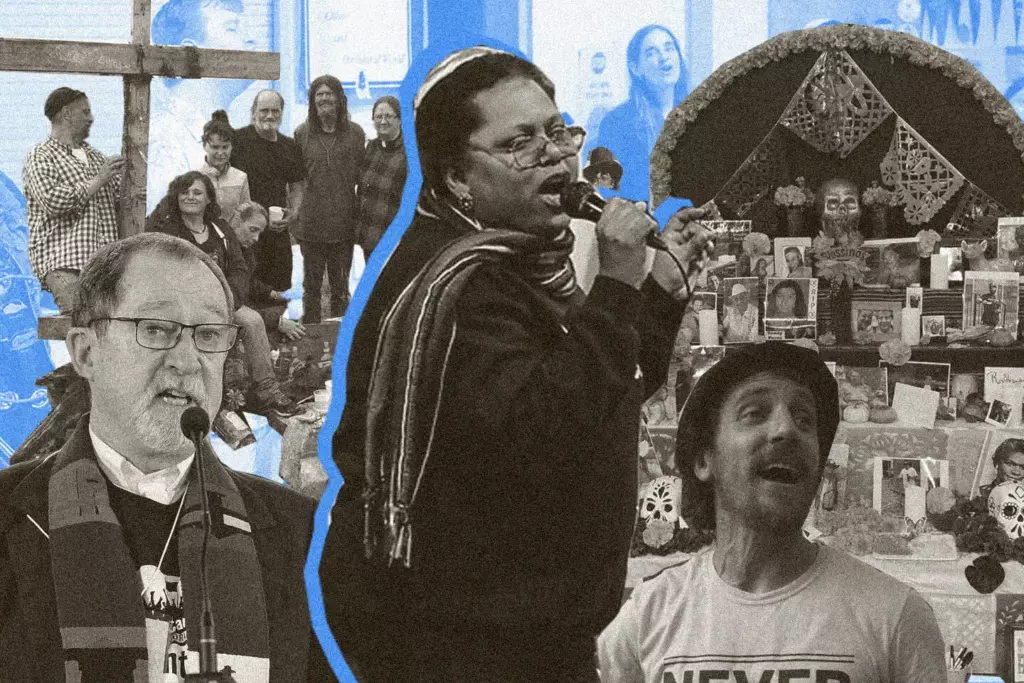
Remembrance
Rituals of remembrance, rooted in ancestral traditions and collective struggle, serve as powerful tools to guide us through present challenges and fuel our pursuit of a more just world.
When grounded in historical context, these practices connect us to generations of movement builders, affirming that social change is a long, sustained effort. The Freedom Church of the Poor lifts up remembrance as an active commitment to justice, reclaiming rituals like Passover, Communion, the Stations of the Cross, Día de los Muertos, and the Longest Night of the Year to honor the lives, struggles, and sacred dignity of the poor and dispossessed. These reimagined rituals challenge dominant narratives, amplify silenced voices, and reaffirm our moral responsibility to care for one another.
As we remember those who came before us, we draw strength from their courage and continue their legacy by walking humbly, loving mercy, and doing justice in our communities today.
INTRODUCTION
I Remember, I Believe
This song was written by Bernice Johnson Reagon after listening to a sermon by her pastor, Reverend A. Knighton Stanley, in Washington, D.C. His message was clear: none of us exist as isolated individuals—we are the result of the dreams, struggles, hope, and determination of those who came before us. Reagon reminds us that on the days when we wake up, turn on the news, and can hardly believe what we see—when American citizens are treated as refugees, when violence and political maneuvering contradict the truth we know in our gut—we must draw strength from our ancestors. Their resilience becomes our foundation, propelling us forward with a responsibility to future generations. "I Remember, I Believe." As long as we know our history, where we come from, and how we got here, we will always be able to make a way for others. (NPR Interview 2005)
Read MoreMy God calls to me in the morning dew
PASSOVER SEDER: THE RITUAL
Passover Haggadah
The Passover Haggadah was written and released by Freedom Shul of the Poor—a spiritual and political community of Jewish leaders in the movement to end poverty. It is a wonderful companion for the Seder table and a guide to understanding the deeply liberatory teachings of Jewish tradition in the Exodus story.
Read MoreWe Get There Together
Joshua wrote this song in 2022 as part of a We Cry Justice artists collective project and was inspired by Dan Jones’ chapter from We Cry Justice, “A Mixed Multitude.” He also drew from the poem by Aurora Levins Morales, “Red Sea,” in which she challenges us to ask: what happens this time if we all cross together? This song has become an important song sung in protest spaces and gatherings calling for a ceasefire in Gaza.
Read MoreWe get there together or never get there at all
Stations of the Cross: The Ritual
Stations of the Cross 2016
Stations of the Cross is a Christian practice that reflects on the last moments of Jesus’s life. For centuries, this devotion has been used to meditate on fourteen images that depict Jesus’s suffering and death. Chaplains on the Harbor (Grays Harbor County, WA)—a group that organizes for dignity and survival among Jesus’ people: the jobless, the homeless, the incarcerated, the addicted—adapted this ritual as a way to tell the stories of suffering in their community through Jesus’s story.
Read MoreDía de los Muertos and All Saints' Day: The Story
How to Build an Altar
Día de los Muertos and All Saints’ Day are sacred times to remember ancestors and those lost to unjust systems. Building an ofrenda—an altar with marigolds, food, water, and mementos—welcomes their spirits and honors their lives. In the Freedom Church tradition, we embrace these rituals in relationship with the communities that practice them, lifting them up as acts of healing, resistance, and commitment to a world where everyone has what they need to live.
Read More